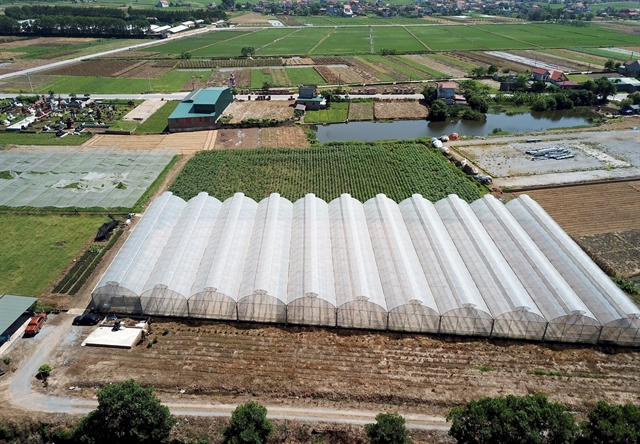 Economy
Economy

 |
| A greenhouse production setup in the northern province of Bắc Ninh. VNA/VNS Photo Đinh Văn Nhiều |
HÀ NỘI Việt Nam's agricultural sector has set a growth target between 3.2-4 per cent in 2024, according to the Ministry of Agriculture and Rural Development (MARD), with total export turnover of some US$54-55 billion.
In addition, the ministry said the sector aims to bring the country's rural modernisation rate to 80 per cent, forest coverage to 42.02 per cent, the number of rural households with access to potable water to over 58 per cent and the number of local products meeting the One Commune, One Product Programme (OCOP) standards to 11,500.
According to the ministry, Việt Nam remains committed to efforts in restructuring its agriculture sector, promoting the development of green, clean, ecological, organic, high-tech and intelligent agriculture and adapting to climate change.
The Southeast Asian economy is to continue shifting towards agricultural economic thinking, extensive international integration, moving from single-sector development to multi-sector cooperation, integrating multiple values in agricultural, forestry, and fisheries products, and shifting from agricultural product supply chains to developing industry chains.
The sector aims to plan production in line with the market and ensure a supply source to meet domestic and export demand. Production will be organised according to regions, linked to geographical indications, traceability of origin, and establishing region-specific planting and breeding codes.
Meanwhile, innovation and development of cooperative economics, support for cooperation, and value chain linkages are among the sector's top priorities, as well as disease control on crops and livestock.
Other priorities include the development of regions and models of aquaculture using high technology and environmentally friendly technology. Stringent measures to combat illegal, unreported and unregulated (IUU) fishing, as recommended by the EC inspection team, will be continued, as well as forest management, protection, and efficient development, along with the comprehensive implementation of natural disaster prevention measures to limit the impact on production.
The sector will continue to seek out new markets and strengthen current markets with a shift towards deep processing, refinement, and effective implementation of the "Agricultural Diplomacy" plan to develop green, sustainable agriculture, ensuring food security, balancing nutrition, and enhancing trade promotion, negotiating the removal of technical and trade barriers, and opening export markets.
MARD said the ministry is to provide all the necessary support for localities in connecting and promoting the processing and consumption of agricultural products, implementing projects to promote the export of agriculture, forestry and fisheries products to markets such as Japan, China, the United States, and the EU.
There will be a strong emphasis on administrative procedure reform, reduction of specialised inspection procedures, and digital transformation to create a favourable environment for attracting investment in agriculture, especially in developing green, clean, ecological, organic, high-tech, and intelligent agriculture.
In 2023, the growth of the agriculture and rural development sector was reported at 3.83 per cent. Total export turnover of agriculture, forestry, and fisheries exceeded $53 billion with a trade surplus of $12.07 billion, the highest figure to date. VNS




